
By Dr. Charles Gilmer
Devotion to Jesus has been a large part of the African-American experience. Should we, as black people, follow this Jesus?
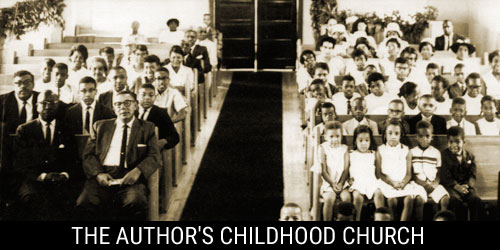 The best historical record of Jesus' life is found in the Bible.
One of the most frequently posed challenges is, “Isn't it just a European book that has nothing to do with our people?” No. Black people appear on the stage of biblical history many times.
The best historical record of Jesus' life is found in the Bible.
One of the most frequently posed challenges is, “Isn't it just a European book that has nothing to do with our people?” No. Black people appear on the stage of biblical history many times.
Several works have been done to chronicle these instances.1 One notable biblical character was Zipporah, Moses' Midianite wife. This means that Zipporah's father, Jethro, was also black.2 In the New Testament, Lucius' comrade in Antioch, Simeon, was called Niger. Niger simply means "black." African nations and African people are quite prominent in biblical times. To say that the Bible is the white man's holy book or to suggest that it is European in origin or nature, is simply not taking into account the facts.
Some ask, "Isn't Christianity a late arrival in Africa? Isn't it a foreign religion to Africa and Africans?"
In his book, The Early Church in Africa, Dr. John Mbiti outlines the fact that the message of Jesus spread throughout Africa before it ever reached Europe. "Christianity in Africa is so old that it can be rightly described as an indigenous, traditional and African religion," says Dr. Mbiti.3
The conversion of the Ethiopian eunuch described in the Book of Acts predates the apostle Paul's first missionary journey into Europe by a number of years. There is clear, historical documentation of the church in Africa by the third century. Christianity was the dominant religion in North Africa and most notably Egypt.
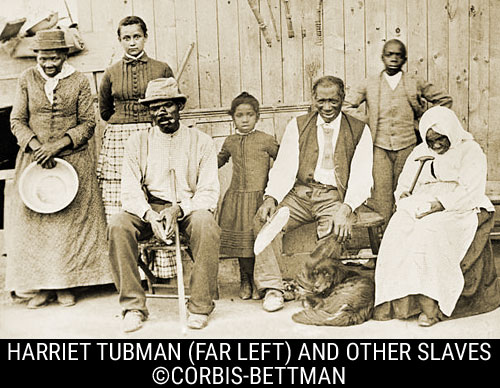 Egyptian and North African scholars such as Clement, Origen, Tertullian, and Athanasius are widely recognized as fathers of the church. By the year 300, Egypt had more than a million Christians. In the sixth century, Christianity spread to the Nubian Kingdoms (today’s Sudan), soon becoming the dominant religion. The Christian Nubian Kingdoms survived for 700 years, resisting attempted domination by Muslim conquerors for 600 of those years.
Egyptian and North African scholars such as Clement, Origen, Tertullian, and Athanasius are widely recognized as fathers of the church. By the year 300, Egypt had more than a million Christians. In the sixth century, Christianity spread to the Nubian Kingdoms (today’s Sudan), soon becoming the dominant religion. The Christian Nubian Kingdoms survived for 700 years, resisting attempted domination by Muslim conquerors for 600 of those years.
The Egyptian Coptic Church in Sudan and the Ethiopian Orthodox Church still exist today. Though persecuted, their presence is testimony to the historicity of Christianity in Africa.4 There is growing evidence that the Nile Valley and present-day Ethiopia launched Christianity in Southern and Western Africa.
Some ask, "Well, didn't Christians start, perpetuate and defend American slavery?"
First of all, slave trading was not introduced to Sub-Saharan Africa from Europe. Arab Muslims had been conducting a slave trade for hundreds of years before Europeans arrived on the west coast of Africa. Second, the slave traders themselves seldom claimed to be devout men, even though they came from "Christian nations."
Look at the life of a white Englishman named William Wilberforce. He led the fight against the slave trade in Parliament because of his commitment to Jesus Christ. His is an incredible story of sacrifice and dedication to truth and justice for African people. While it took his entire life to win this victory, win he did.
In the United States, however, Christians reacted to slavery in a substantially different way than the Europeans. While there was vocal Christian protest against the slave trade, and much of the abolitionist movement was spear-headed by Christian people, there were also many Christians who defended slavery. The issue of slavery grew more divisive, and eventually, most of the major Protestant denominations divided over the issue. This actually set the stage for the Civil War.
While many factors contributed to the onset of the Civil War, slavery was a principal cause for the split of the nation, South from North. Many rightly contend that Abraham Lincoln's original objective in the war was not the removal of slavery from the South. Yet it is clear that as the war dragged on, he began to sense the larger drama. In his Second Inaugural Address, Lincoln spoke eloquently of his growing belief that God was judging the United States for indulging the wicked institution of slavery.
Our nation lost more lives in that one conflict than in all its other wars combined. Perhaps we can conclude that God did not turn a blind eye to the sufferings of the slaves, nor did He wink at the conduct of those who oppressed African people in America.
What was the attitude of the slaves through all of this? How could our forefathers embrace the religion of their oppressors?
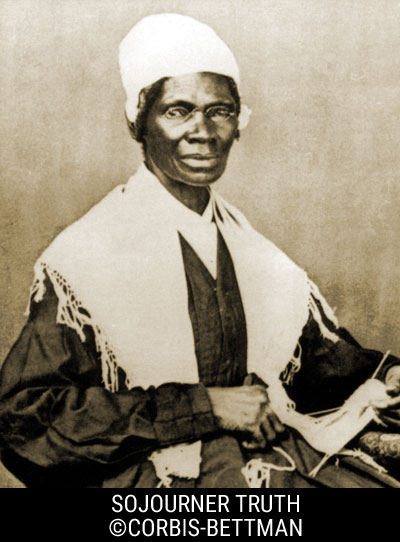 Missionary efforts among the slaves were allowed because owners assumed that Christianity would make slaves better workers.
Missionary efforts among the slaves were allowed because owners assumed that Christianity would make slaves better workers.
The slaves discovered this contradiction but did not allow that to interfere with receiving the transcendent truth of the Bible. In its pages, they found hope, courage, strength and comfort. Their spirituals are the legacy of the faith of those who, from an earthly standpoint, had cause for despair.
The slaves who turned to Jesus knew the difference between some of the versions of Christianity they were seeing practiced and the Christianity they were hearing described in the Bible. Hence the line in the spiritual, "Everybody talkin' 'bout heaven ain't goin' there." They chose to follow the Jesus they saw in the Bible. Jesus provided the hope and power they needed to survive slavery.
This faith enabled our forefathers to endure trials and hardships that we can only imagine. This faith inspired leaders to respond courageously to the problems of our people. These leaders were the likes of Harriet Tubman, Frederick Douglass, Sojourner Truth, and the thousands of former slaves who enlisted in the Union Army to fight for their freedom.
The Bible taught them that they were children of the Most High God, citizens of His heavenly kingdom, and that they had inherent value as humans. When they entered into prayer and worship, they experienced a fleeting but galvanizing foretaste of an eventual eternal reward.
The North's victory in the Civil War did not end our problems. Black Americans again found themselves being systematically and legally oppressed. Unfortunately, once again, many who claimed to be Christians were involved in the reign of terror, which sought to keep African Americans in their place.
The Southern white church was at best silent, and at worse, actively defending the conduct of those who were marauding among, intimidating, and lynching our people. Very few black families today are devoid of horror stories of relatives and friends who were abused and/or murdered. Black societies and businesses were seldom allowed to survive.
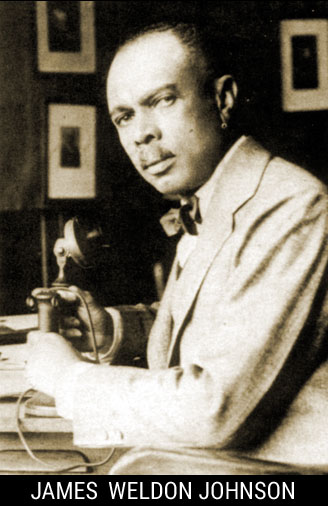 The black community found refuge in the church.
The black community found refuge in the church.
The vibrancy and progressive power of the black church is well documented. It was in the churches that the black colleges were conceived, given birth and prayed for. It was in the churches that a young and vibrant NAACP carried on its membership drives. It was the clergy who often provided the leadership for the black community at large. And it was the church that gave us our drum major for justice, the Rev. Dr. Martin Luther King, Jr.
Faith in Jesus Christ has not created passivity but rather activism in thousands of African Americans.
Those who have followed Jesus Christ have been some of our most effective leaders, our most impressive achievers, and our most eloquent spokespeople. By their own testimony, these African-American Christians declare that it was their relationship with Jesus that fueled their struggle, energized their activism, and gave them hope for a better future for our people.
Martin Luther King's Southern Christian Leadership Conference was the most visible manifestation of the Christian presence in the Civil Rights Movement. Those early mass meetings were characterized by prayer, the singing of hymns and spirituals, and an orderliness of conduct that revealed the Christian influence of the attendees.
Dr. King's appeal was to the moral conscience of the nation, based on its Judeo-Christian values. Yet, the white church failed to support his pleas for justice, freedom and equal treatment. It took the emerging electronic media's coverage of atrocities in the South to finally shame a reluctant federal government to get involved. It was the government, not the white church, that secured the rights for which so many had prayed, marched and shed blood.
A generation of African Americans began to drift away from the church.
No longer do we look to God as the one to whom we are accountable. We are our own authority. Some even teach that "The black man is God."
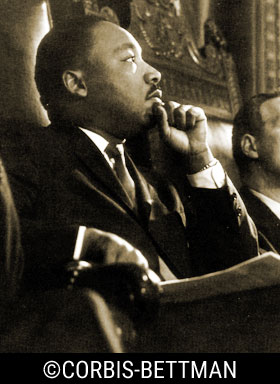 If this is so, then we can define our own morality, establish our own standards of behavior, and sit in judgment of everyone else. But we have failed because we are not God. No wonder drug trade is seen as an understandable and too often an acceptable career choice. No wonder teenage pregnancy continues to rise and sexually transmitted diseases are approaching epidemic proportions.
If this is so, then we can define our own morality, establish our own standards of behavior, and sit in judgment of everyone else. But we have failed because we are not God. No wonder drug trade is seen as an understandable and too often an acceptable career choice. No wonder teenage pregnancy continues to rise and sexually transmitted diseases are approaching epidemic proportions.
It almost seems that African-American culture is being overrun by a pathological pursuit of self-aggrandizement, sensuality and prosperity at any cost.
The poet and educator James Weldon Johnson proved to be prophetic when he wrote the last stanza of "Lift Every Voice and Sing" in 1921. This work came to be known as the Negro National Anthem and was sung daily after the Pledge of Allegiance in many black schools up until the time of desegregation. His lyrics warned us of the potential for our current predicament:
God of our weary years, God of our silent tears,
Thou who hast led us thus far on our way,
Thou who hast by thy might led us into the light
keep us forever in the path we pray.
Lest our feet stray from the places, our God, where we met Thee.
Lest our hearts, drunk with the wine of the world, we forget Thee.
Sadly, too many of our feet have strayed. Too many of our hearts are drunk.
What should we do now? How can we honor our history, respond to the present, and build a viable, vibrant future for our people?
It is not too late. In any case, it starts with an individual choice. You must choose Jesus for yourself.
Choosing Jesus prepares you to be a real agent of change in our community. A vibrant relationship with Christ will give you the power to govern yourself and live according to what is right, not according to what is expedient.
Those of us who discover the power of a relationship with Christ and who see the need for spiritual transformation in our community must band together to build a new future.
We must tell the truth about the challenges we face and develop an agenda for overcoming those challenges. That agenda emanates from Jesus. In the Book of Proverbs in the Bible it says, "Righteousness exalts a nation…"5 If we allow the righteousness of Christ to flow through us, and thereby through our community, we can turn the tide.
We have been looked down on so long and so pervasively, and our people disappoint us so often, that we can begin to wonder if the negative stereotypes are really true. In this vulnerable state, we are susceptible to the persuasiveness of eloquent orators who will tell us that we are the best, brightest, most noble people on the earth. It is easy to buy into ideas that lift black people above all others. Our righteous anger is easily manipulated to get us to buy into theories of a white conspiracy to hold us back. It feels good to hold someone else responsible for our struggles. Of course, there is plenty of racism remaining in this society, supplying fuel for those who would stoke the fires of rage and resentment.
Jesus, in what he taught and what he modeled, provides a different perspective. He teaches us that those who have oppressed us will be called to account for their actions. He also directs our attention back to our own responsibility. We will be called to reckon with our own choices.
Jesus spoke a message that echoes across the landscape of time and penetrates to the heart of our predicament.
"I tell you the truth, everyone who sins is a slave to sin. So, if the Son sets you free, you will be free indeed." John 8:34,36
All the problems we face as individuals and as a people can be summarized in one word – sin.
Sin is the biblical word for those actions and our general state of non-conformity to the will and design of God. All sin is harmful.
Black people's suffering is either because of someone else's sin or due to our own. Yet, Jesus promises to free us from sin.
Jesus took on human flesh, walking this earth, and dying a painful, humiliating death to pay for the punishment of our sin. He created an infinite and eternal payment for sin by submitting Himself to death. How do we access this freedom that Jesus purchased for us? By personally accepting him as Savior and Lord.
This is the freedom our forefathers found in the midst of slavery. The freedom to transcend their circumstances. The freedom that comes from living on the basis of a higher reality. This is the freedom that ignited the activity of so many who have fought for the freedom and dignity of our people. This is the freedom that you can experience if you will place your trust in Him.
We have an extraordinarily rich spiritual heritage. And Jesus is central to that heritage. We can honor their memory by rediscovering the faith that allowed our forbearers to survive. We can build on the legacy they have left us by carefully following the one they followed – Jesus.
You have the opportunity to live out an incredible, eternal, transcendent purpose – a purpose rooted in an eternal hope. Many are involved in seeking to bring about change in the black community. Yet, without an eternal perspective, without a hope fixed on a God who is just, loving, and who offers eternal life, all our striving has to be measured by its effect here and now, in our immediate experience. There is a lot of noble talk about needing to bring about change for the sake of the next generation. But without an eternal perspective, those who live on the margins of society have little reason to hope. They have little power. They have limited opportunities. Why should they turn away from the temptations and enticements that offer them quick rewards and a short-term escape?
A relationship with Christ offers not only hope, but the power to do what is right. This is another implication of Jesus' statement, "the truth will set you free." Jesus, in all His power, promises to take up residence in the life of those who place their trust in Him. He gives us the power to resist temptation and to live a godly life. In other words, He gives us the freedom to do what is right instead of being enslaved by our own desires and passions.
Don't let the lies being told about Jesus keep you from knowing the truth. Watch out for those who will play to your emotions, provide pseudo-intellectual arguments, but have bizarre notions built into their beliefs. Like so many of our forefathers, you will find in Jesus a kind, compassionate, powerful friend. One who can give you a new life and set you free from the penalty and power of sin. Then and only then will you be able to see the world clearly, according to truth, and find the purpose for which God created you.
The truth about Jesus is that He is our only sure and lasting hope. Black people were not an afterthought, nor has He relegated us to some secondary position in His kingdom. African people have been a part of His working from the beginning. He is the Savior of all mankind and He will work in the midst of any people who place their trust in Him. The history of African Americans is an illustration of this fact. And He awaits our response to manifest His love and power to us once again.
God has a purpose for African Americans. We were created for a noble, yes, even a divine destiny. As we follow Him, we will fulfill that destiny. A destiny of eternal significance. A destiny of present impact on our community. A destiny that maximizes the potential God built into you when He created you. There is no higher calling, and no better life.
"At times we may feel that we do not need God … There is so much frustration in the world because we have relied on gods rather than God. These transitory gods are not able to save us or bring happiness to the human heart.
"Only God is able. It is faith in Him that we must rediscover. With this faith we can transform bleak and desolate valleys into sunlit paths of joy and bring new light into the dark caverns of pessimism."
—Dr. Martin Luther King, Jr.
| ► | How to know God... |
| ► | I have a question or comment... |
Footnotes: (1) Several good works have been done on the presence of black or African peoples in the Bible. Beyond Roots by Rev. Dwight McKissic is a simple biblical survey of the subject for popular audiences. Troubling Biblical Waters by Dr. Cain Hope Felder is a more scholarly work, sifting the subject through the filters of the more skeptical schools of textual criticism. (2) Exodus 2:15ff; Numbers 12:1. (3) John S. Mbiti, African Religions and Philosophy (London: Heinemann, 1969), p.229, as cited in The Early Church and Africa, John P. Kealy and David W. Shenk, Nairobi Oxford University Press, 1975, p.1. (4) Ibid., pp.290-295. (5) Proverbs 14:34.
 Dr. Charles Gilmer is the Founding and Past President of The Impact Movement, Inc., a partner ministry with Cru, which takes the truth of Jesus Christ to the campus, the community and the world by producing leaders of African descent who are spiritually focused, financially responsible and morally fit. He has spoken on campuses across the US and in Africa on race relations, missions and the Christian faith. He is a graduate of the University of Pennsylvania, and has been honored with a Doctor of Divinity degree by Carver Bible College. Charles and his wife, Rebecca, are currently studying at Princeton Theological Seminary. They have six children and seven grandchildren.
Dr. Charles Gilmer is the Founding and Past President of The Impact Movement, Inc., a partner ministry with Cru, which takes the truth of Jesus Christ to the campus, the community and the world by producing leaders of African descent who are spiritually focused, financially responsible and morally fit. He has spoken on campuses across the US and in Africa on race relations, missions and the Christian faith. He is a graduate of the University of Pennsylvania, and has been honored with a Doctor of Divinity degree by Carver Bible College. Charles and his wife, Rebecca, are currently studying at Princeton Theological Seminary. They have six children and seven grandchildren.
Images provided by Corbis-Bettman Archive are prohibited from being copied for commercial purposes.
Other articles/videos you might be interested in…